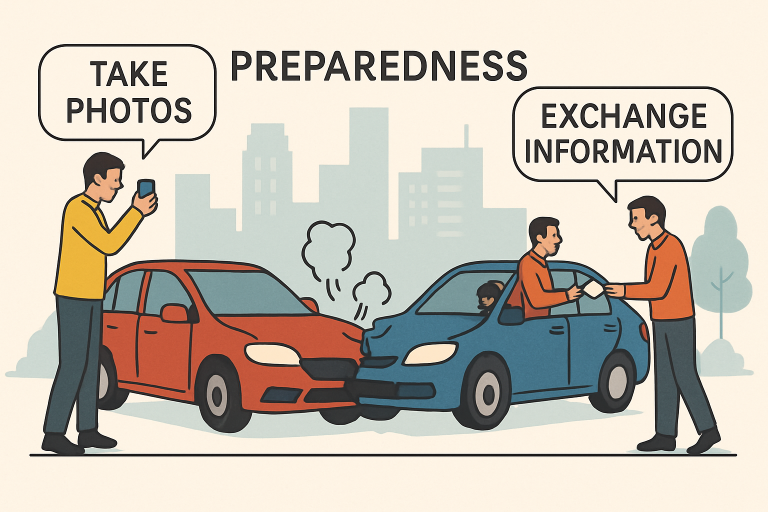Key Takeaways
- Being proactive after an accident can significantly improve claim outcomes.
- Understanding what evidence to collect at the scene is crucial.
- Staying organized with documentation makes the claims process smoother.
- Legal and insurance considerations differ from state to state.
- Resources are available to help drivers make informed decisions after a crash.
Table of Contents
- Why Preparation Matters After a Car Accident
- Steps to Take at the Scene
- Gathering and Preserving Critical Evidence
- Dealing with Insurance Providers Effectively
- Common Challenges in Car Accident Claims
- When to Seek Legal Guidance
- Helpful Resources and Final Thoughts
Why Preparation Matters After a Car Accident
With millions of car accidents occurring annually in the United States alone, most drivers will eventually face an unexpected collision. The aftermath can be stressful and confusing, but knowing how to react makes the process far less daunting and protects your legal and financial future. Consulting a qualified Tampa car accident attorney can ensure that you follow the correct steps and help maximize your claim if you ever find yourself in this situation.
Preparation is more than just knowing what to do; it’s about making intentional choices before and after a crash to protect yourself, your passengers, and your rights. Being ready improves your chances of fair compensation, reduces delays in the claims process, and helps you avoid common pitfalls. As the National Highway Traffic Safety Administration reports, road accidents are a leading cause of injury—yet many losses can be mitigated with proper action and documentation.
Understanding which steps to take immediately after an accident can make all the difference in the outcome of your car accident claim. From ensuring everyone’s safety to collecting evidence, every action you take can have legal and financial implications later on. Remaining calm and methodical is key; high emotions can hinder decision-making and may lead to missed opportunities for gathering crucial details.
Many drivers underestimate the value of documentation at the scene. Thorough notes, photos, and witness information offer objective proof of what happened, helping with insurance negotiations and potential legal disputes. A prepared driver is better equipped to counter challenges such as contested liability or incomplete claims, especially in states where regulations and fault determinations vary significantly.

Steps to Take at the Scene
- Check for injuries: Immediately ensure your safety, that of your passengers, and that of others involved. Call for medical help if anyone is hurt.
- Move vehicles if possible: Once it’s safe, move vehicles out of traffic to avoid blocking the roadway and to prevent further accidents.
- Exchange information: Swap names, contact details, insurance policies, license plate numbers, and driver’s license information with all involved parties.
- Document the scene: Take comprehensive photos of damage, road conditions, street signs, and the overall scene. If possible, collect statements and contact info from witnesses.
Acting quickly yet carefully at the scene helps create an indisputable record of the incident, which will be invaluable when dealing with insurance companies and, if necessary, in court. Even minor accidents should be treated seriously—often, issues can arise long after the fact if something important was overlooked.
Gathering and Preserving Critical Evidence
Prompt, thorough evidence collection is essential for any successful claim. Insurers and attorneys rely on the initial documentation to accurately reconstruct events and determine fault. Make sure to:
- Photograph all vehicles, damage points, skid marks, and the surrounding environment from various angles.
- Make note of time, weather, lighting, and road conditions.
- Request a copy of the police report on-site or follow up at the police department afterward.
- Track medical visits and treatments from the beginning—even minor injury symptoms should be documented, as they can become more serious over time.
According to Consumer Reports, having a ready-made accident checklist in your vehicle can help you gather all the necessary information without missing key details. Being systematic ensures you won’t overlook anything significant in the stressful aftermath of a crash.
Dealing with Insurance Providers Effectively
The claims process is often more complex than most drivers expect. When speaking with insurance representatives, be concise and fact-based. Avoid unnecessary speculation and never admit fault at the scene or during early communications. Keep copies of emails, letters, and any documents you exchange with your insurer. Prompt, accurate responses to adjusters’ requests facilitate smoother processing and may reduce disputes.
Many drivers get tripped up by the technical jargon or misunderstandings surrounding coverage and fault, so careful documentation and factual communication are crucial. Knowing your policy details, including coverage limits and required timelines for filing, can help you avoid unintentional mistakes that may jeopardize your claim.
Common Challenges in Car Accident Claims
Even the most straightforward-seeming car accident claims can encounter obstacles. Common issues include disputed liability, lapses in evidence collection, slow medical diagnoses, and confusion about state-specific insurance rules. Some states operate under “at-fault” insurance models, while others use “no-fault” systems, impacting payouts and legal options. As Forbes Advisor explains, knowing your state’s approach may determine whether you file through your insurer or pursue the other driver’s insurance.
- Fault and liability disputes between involved drivers or their insurers.
- Insufficient or poorly organized documentation.
- Delays in medical treatment or diagnosis that impede accurate injury assessment.
- Varying insurance laws and requirements across state lines.
When to Seek Legal Guidance
While many fender-benders can be resolved without legal intervention, specific situations require professional help. Serious injuries, unclear fault, denied or underpaid claims, and uncommunicative insurance adjusters are all signs you may need an attorney. A qualified legal professional can help secure evidence, interpret insurance policy language, and fight for the full compensation you deserve. Relying on experienced advice can alleviate stress and protect you from costly mistakes.
Helpful Resources and Final Thoughts
Staying vigilant and informed is your best defense against the unpredictability of car crashes and the sometimes complex world of insurance claims. Use resources from entities like the Insurance Information Institute for up-to-date guidance and best practices. Regularly check consumer protection agencies and state transportation departments for evolving car accident laws and safety recommendations.
A calm, organized, and proactive approach is the best way to navigate the aftermath of an accident. By taking control of documentation and seeking professional help, you protect your interests and pave the way for a smoother claims process—safeguarding your rights, well-being, and peace of mind for the road ahead.

